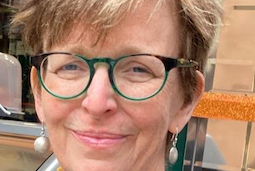WCC marks World Mental Health Day

Photo: Albin Hillert/WCC
Source: WCC
The World Council of Churches (WCC) marked World Mental Health Day on 10 October with a morning prayer and reflections. The theme for this year's World Mental Health Day is "Compassion in Crisis: Restoring Hope and Mental Well-being."
Lorena Catalina Bonilla, chair of the Mental Health Working Group of the WCC Commission of the Churches on Health and Healing; and John Christensen, WCC project officer for Health and Healing and the Ecumenical Disabilities Advocacy Network, reflected on the meaning of true health and healing in society.
Bonilla: This year's global campaign, with the theme "Access to Services: Mental Health in Catastrophes and Emergencies," highlights the urgent need to support the mental health and psychosocial wellbeing of individuals affected by humanitarian emergencies. In contexts of conflict, disaster, or displacement, one in five people may experience a mental health condition. In 2025, an estimated 305 million people worldwide will require humanitarian assistance and protection; among them, 67 million are living with mental health disorders in crisis settings.
What is the role of faith-based and humanitarian organisations?
Bonilla: Mental health services are too often disrupted or deprioritised during emergencies due to damage to health infrastructure, shortages of medicines, and the limited availability of trained personnel. Despite increasing recognition of mental health and psychosocial support-and the encouraging reality that 85% of countries in crisis settings now report offering some form of mental health and psychosocial support-coverage and quality still fall far short of what is needed.
Faith-based and humanitarian organisations continue to stand at the frontlines of response, serving communities amid growing crises and limited resources.
What must we do?
Christensen: On this World Mental Health Day, we, as churches and faith communities, should renew our collective resolve ensuring that mental health is valued, protected, and accessible to all, especially to those most vulnerable and affected by emergencies.
As faith communities, we must be vigilant and respond to the humanitarian needs arising from numerous conflicts and disasters. Our compassionate presence and commitment to holistic care must embody the principle that mental health is essential, not optional.
What does "mutual care" mean to you?
Christensen: We are mandated for mutual care within and beyond the community, responding to the needs of others in compassion, solidarity, and love, regardless of difference or distance, bearing one another's burdens, and this way we will fulfil the will of God. (Galatians 6:2)
Let us honour the courage and dedication of frontline workers and volunteers, ensuring that they, too, receive the protection, supportive supervision, and time for rest and self-care that they greatly need.
As we work to promote peace, healing, and reconciliation, let us respond to emergencies in ways that are timely, holistic, and sustainable, recognising that the mental health of individuals and communities is central to human dignity and lasting recovery.


















